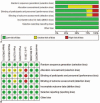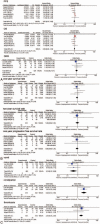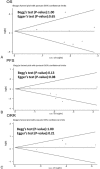Angiogenesis inhibitors for the treatment of small cell lung cancer (SCLC): A meta-analysis of 7 randomized controlled trials
- PMID: 28353568
- PMCID: PMC5380252
- DOI: 10.1097/MD.0000000000006412
Angiogenesis inhibitors for the treatment of small cell lung cancer (SCLC): A meta-analysis of 7 randomized controlled trials
Abstract
Background: This study aimed to assess the effectiveness and safety of angiogenesis inhibitors for the treatment of patients with small cell lung cancer (SCLC) via meta-analysis.
Methods: Electronic databases including PubMed, Embase, and Cochrane Library were searched to look for eligible studies through February 1, 2016. RCTs comprising angiogenesis inhibitors and nonangiogenesis inhibitors for SCLC patients were investigated. The extracted data including overall survival (OS), progression-free survival (PFS), and objective response rate (ORR) were summarized. In addition, the common adverse events (AEs) were also explored.
Results: There were 7 phase II/III RCTs, encompassing 1322 SCLC patients eligible for meta-analysis. In comparison to nonangiogenesis inhibitors, angiogenesis inhibitors treatment was not associated with improvement of PFS [HR = 0.87, 95% CI (0.74-1.02), P = 0.09), OS [HR = 0.99, 95% CI (0.88-1.12), P = 0.91], or ORR [OR = 1.12, 95% CI (0.85-1.47), P = 0.41). Also, there was no improvement in 1-year survival rate [OR = 0.96, 95% CI (0.74-1.19), P = 0.63)], 2-year survival rate [OR = 1.00, 95% CI (0.66-1.51), P = 1.00)] or 1-year progression-free survival rates [OR = 0.95, 95% CI (0.69-1.31), P = 0.76)]. However, from subgroup analyses, it was observed that angiogenesis inhibitors improved ORR [HR = 1.66 (95% CI 1.02-2.71), P = 0.04] in phase II studies and bevacizumab improved PFS [HR = 0.73 (95% CI 0.42-0.97), P = 0.04]. It is important to note that angiogenesis inhibitors reduced emesis [OR = 0.38, 95% CI (0.17-0.85), P = 0.02], but increased incidence of constipation [OR = 4.02, 95% CI (2.14-7.55), P < 0.0001) and embolism [OR = 2.24, 95% CI (1.45-3.47), P = 0.0003).
Conclusion: Adding angiogenesis inhibitors to chemotherapy did not improve PFS, OS, ORR, 1-year survival rate, 2-year survival rate or 1-year progression-free survival rate for SCLC. However, subgroup analysis revealed that bevacizumab enhanced PFS. Angiogenesis inhibitors also had a high incidence of constipation and embolism.
Conflict of interest statement
The authors have no conflicts of interest to disclose.
Figures




References
-
- Siegel RL, Miller KD, Jemal A. Cancer statistics, 2016. CA Cancer J Clin 2016;66:7–30. - PubMed
-
- Gironés R, López P, Chulvi R, et al. Ten years of lung cancer in a single center: gender, histology, stage and survival. J Cancer Metastasis Treat 2015;1:201–7.
-
- Sher T, Dy GK, Adjei AA. Small cell lung cancer. Mayo Clin Proc 2008;83:355–67. - PubMed
Publication types
MeSH terms
Substances
LinkOut - more resources
Full Text Sources
Other Literature Sources
Medical

